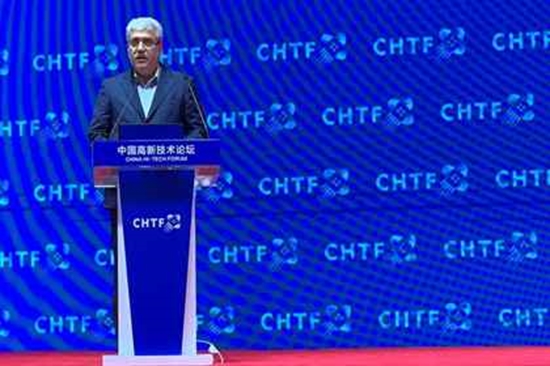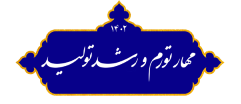Sorena Sattari in “Advanced Technologies Exhibition in China”:
Iran’s empowerment in improving the “knowledge-based ecosystem” is the topic of international collaborations.
With the goal of developing scientific, technological and knowledge-based cooperation, Sattari traveled to China. During this trip, he addressed Chinese technologies to mention the leap of Iran and passing oil-based economy and moving to knowledge-based economy. During his speech

With the goal of developing scientific, technological and knowledge-based cooperation, Sattari traveled to China. During this trip, he addressed Chinese technologies to mention the leap of Iran and passing oil-based economy and moving to knowledge-based economy. During his speech, he considered the advancements of Iran a foundation for exchange of experiences and development of international cooperation with a knowledge-based topic.
According to the information center of national elites foundation, the opening ceremony of the “21st advanced technologies exhibition of China” was held in Shenzhen in the presence of the authorities of the country. Notably, the high-ranking scientific and knowledge-based Iranian delegation attended the ceremony.
The head of the delegation, Sorena Sattari, the vice president for science and technology affairs, presented a lecture on the event, which is held during November 13th-16th, 2019 in Shenzhen.
Sattari talked about the scientific and technological capacities of Iran and announced the preparedness of Iran to expand scientific and technological cooperation with Chinese researchers.
In the message of the vice president for science and technology affairs to the attending scientists and authorities, we read:
Dear Audience, Ladies, Gentlemen
Good Evening
I am so happy to be here and hope that holding such events will deepen cooperation and business and technology links between countries.
I would like to take this chance to talk about friendly cooperation in the field of high-tech business. As you know, the international exchange of advanced products and technologies at the international level has provided a vital opportunity to meet the challenges of societies. Therefore, the cooperation of countries in the development and diffusion of technological innovations is the impetus for the ever-growing and progressive nations. In this context, Iran has attempted to use innovation as a tool to support moving toward welfare and development using its open attitude toward its technological achievements. After years of efforts by its researchers and scientists and to achieve a high status in scientific and technological achievements, my country expresses its determination to expand strategic partnerships in the promotion of innovation and mutual benefit. I believe that the Islamic Republic of Iran's experience in utilizing science and technology to meet the country's needs in the face of cruel international restrictions has provided valuable lessons for various countries. Therefore, I would like to use this time to explain about my country’s experience in passing from an economy based on natural resources, which does not depend on domestic abilities, to an economy that mostly relies of knowledge-based productions. I hope that the science, technology and innovation development path in Iran provides a teaching experience for different countries.
Dear audience, Iran has always been recognized as a land enriched with natural and cultural heritage. From one hand, this reality provides extensive facilities to move toward advancement in the country. On the other hand, it shows us the risk of reliance on previous belongings and sufficing to irresponsible exploitation of natural resources. Since a few years ago, we have dealt with the issue that where should we be in this field: creating wealth from ending natural resources and living with past reserves or creating new loops creating value and building the future. Today, I can proudly announce that we selected the second way. Decades of reliance on internal capability has made it possible for our country to take a step further through the valuable achievements in aerospace technologies, ICT, nano, bio, stem cells, cognitive science, renewable energy and pharmaceutical and medical technologies. Let us take a big step toward changing our economy image to a knowledge-based economy.
In the recent past, cheap and easy money from the sale of raw materials became a waste of capacity and inefficiency. The government got bigger and bigger with oil money and eliminated risk-taking motivation and value-added formation in universities and national industries by providing them with cheap financial resources. The outcome of the process could jeopardize the country's future and frustrate the country's young and creative forces. Therefore, a serious change was needed.
A public call to refrain from what is called a curse of resources has created a new resolve in the Islamic Republic of Iran to safeguard the interests of society: we need to build a creative future through innovation. Since the mid-1990s, innovation has become one of the most important policy keywords in Iran. Since then, changes have been made at the highest levels of the country's policy to synchronize capacities for the development of scientific and technological innovation. Forming institutions at the highest level of policy making, such as the Vice-Presidency for science and technology affairs, supreme council of science, research and technology, Iran national innovation fund, and special technology development headquarters, has been one of the efforts made in this area. At the same time, the orientation of policies in national documents towards scientific and technological development was adjusted and supportive laws were adopted to promote technology penetration in the industry. The country's comprehensive scientific plan and special law for support of knowledge-based companies are the most important examples that have led to the formation of a major innovation movement in universities and domestic industries. Along with the mentioned evolutions, formation of infrastructures such as business growth centers, accelerators, science and technology parks, special science and technology regions, research and technology funds and venture capitals, has largely filled the gap of existing units in the national innovation system of Iran.
These developments, which can be described as steps to strengthen Iran's national innovation system, are based on three core rationales: 1) prioritization of strategic technologies based on upstream country policies and sustainable development goals, 2) simultaneous support for startup businesses to disseminate innovation and for conventional industries to create innovative outputs and ultimately, and 3) the transition from an innovation system relying on government resources to an innovation ecosystem. These policies have already given a fresh image of the Iranian economy; an economy facilitated by smart government participation and a significant share of venture capital financing. Now, in this picture, there is a plausible link between academic research on the one hand and the needs of society and industry on the other. Domestic industries are more motivated to enter higher value chains, and young entrepreneurs are showing more opportunities to startup businesses.
Dear audience, I want to emphasize that my country is now in the middle of a path that, with the efforts of scientists, entrepreneurs and government support, has created a huge social capital to support innovation policy. After two decades of attempts, Iran is now ranked 16th in the world in terms of scientific publications, which is an improvement compared to 18th in 2005. After a successful transition, we have been able to have the most engineering graduates in the world, according to our domestic needs. Due to this move, we have been able to increase the share of high and medium-quality products from $1.5 billion in 2005 to $12 billion in 2014. In terms of scientific achievements, Iran has more than 229 thousand PhD students and a 1.85% share in scientific production of the world. For instance, in the field of nanotechnology, Iran is in fourth place after the leading countries of the United States, China and India. I should point out that these brilliant statistics have all come from the development of science, technology and innovation infrastructures. Iran has more than 2,390 universities around the country with about 4.8 million students. In addition, there are 44 science and technology parks in Iran that have provided space for more than 4500 companies. In terms of financial infrastructure to support innovation, Iran national innovation fund has funded 5400 innovative projects with a capital of $395 million.
I emphasize that Iran's policy transition to a knowledge-based economy has also had remarkable results in terms of innovation outputs. Since the approval of the law for support of knowledge-based companies in 2010, about 4700 companies have received the “knowledge-based” title based on their technological abilities. In this short period, these companies have been able to produce $11 billion of the total annual value of the Iranian economy and have created direct jobs for more than 300,000 people. I would like to provide some examples of these technological companies; CinnaGen is active in the field of drug production with an emphasis on biotechnology. Today, this company is the largest export of bio-drugs in the region. In addition, Kish Tissue Regeneration Corporation is an example of considerable advancements of Iran in the field of stem cells. This is one of the leading companies of the world in terms of producing bio implants. Moreover, Tuga Co. is a leading company in design and production of power turbines while Pooyandegan Rah Saadat Co. is one of the largest Iranian knowledge-based companies that has marketed numerous technology-based products in the medical field. furthermore, Snap is the first unicorn startup of Iran in the field of urban transportation with more than one million drivers and is now ranked seventh in the world.
Dear friends, it may be better to present in fuller detail what I have presented here as the experience of two decades of Iran's attempt to transition from a resource-based economy to a knowledge-based economy. This is Iran's dramatic breakthrough in the Global Innovation Index over five years. According to the latest Global Innovation Index report, Iran's ranking of innovation performance in 2019 among the countries of the world has improved by 60 levels. In almost all respects, the Islamic Republic of Iran has reflected the innovation performance at the national level, making a successful investment towards the creation of a dynamic innovation ecosystem.
I believe that this great move could not have been possible except with the great decision to cut off dependence on easy resources. At the same time, I emphasize that the current point is not the end of the route. Rather, we are in the midst of the difficult challenges ahead. The first and foremost challenge is to establish the importance of science, technology and innovation policy and its ability to coordinate across different policy sectors and levels. Another challenge is to improve research productivity by funding research with a competitive rationale based on the performance of research institutions. Meanwhile, transferring research and development activities from the public sector to the private sector, which in turn promotes research achievements, is a challenging goal. Moreover, unrestricted access to international capital resources to finance innovative projects requires a serious international determination that is difficult to achieve. Finally, the dissemination of innovation to the various economic sectors that exploit these sectors from the results of the knowledge-based economy is a serious policy challenge.
Dear friends, the version I offer here in light of the experience of innovation policy in the Islamic Republic of Iran to address these challenges is to deepen international cooperation to open access to innovation for all societies. Exchange of scientists, entrepreneurs, and technology based on the mutual benefit of nations, collaboration on major industrial projects based on national priorities, collaboration on the development of creative and startup solutions to different societies' problems, sharing policy experiences on different innovation ecosystems through dialogue and dialogue, and mutual investment in innovative projects internationally are different types of collaborative efforts that can be effective in fostering the nation's innovation capacity. I would like to emphasize that, given the will of the Government of the Islamic Republic of Iran to expand strategic partnerships with various governments in the field of innovation dissemination, there is now a good opportunity to share scientific, technological, human, financial and market capacities in Iran. I believe that cooperation in this area will be possible with the serious determination of the partner governments. In the end, I appreciate your attention, and I hope that this event will be a venue for friendly and long-term engagement of countries in science, technology and innovation.”
The science, technology and knowledge-based delegation of Iran traveled to China with the presidency of Sorena Sattari, the vice president for science and technology affairs. The delegation encompassed the managers of 70 knowledge-based companies, and helping the development of export of knowledge-based companies from Iran to China and laying the foundation for technological exchange at the level of agencies of both parties were some of the goals of this trip.






 adress : No. 209 , between Navab Str and Roudaki Str. Azadi Str. Tehran - Iran
adress : No. 209 , between Navab Str and Roudaki Str. Azadi Str. Tehran - Iran  phone: +98 21 63478000
phone: +98 21 63478000